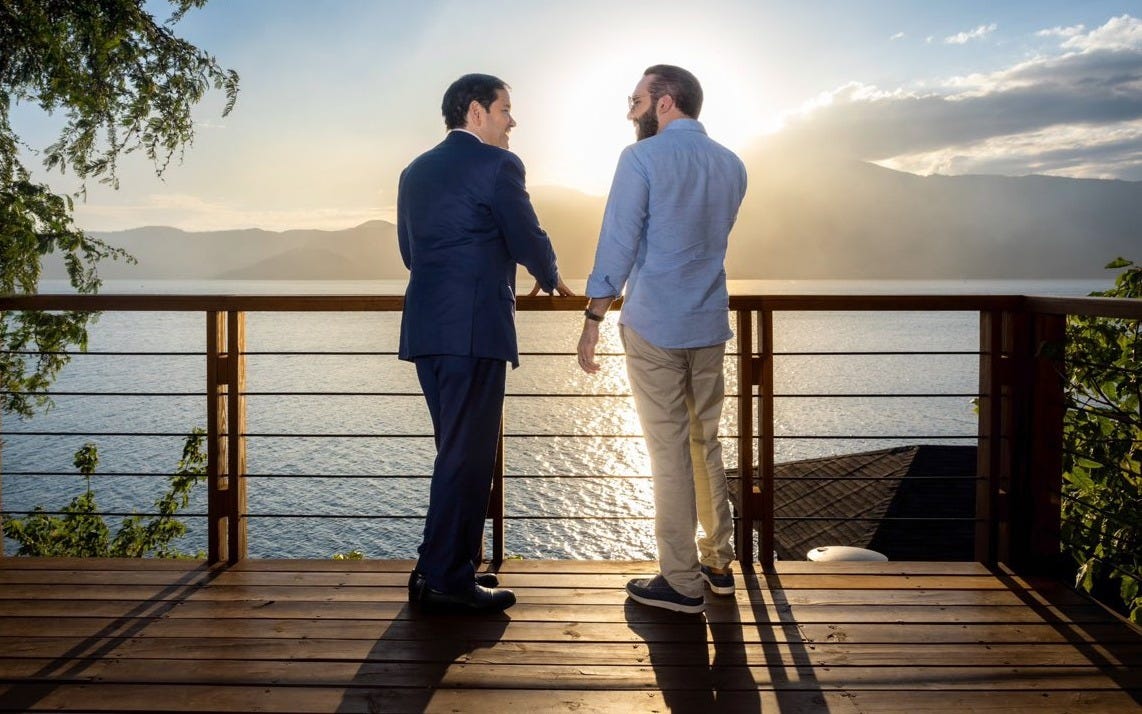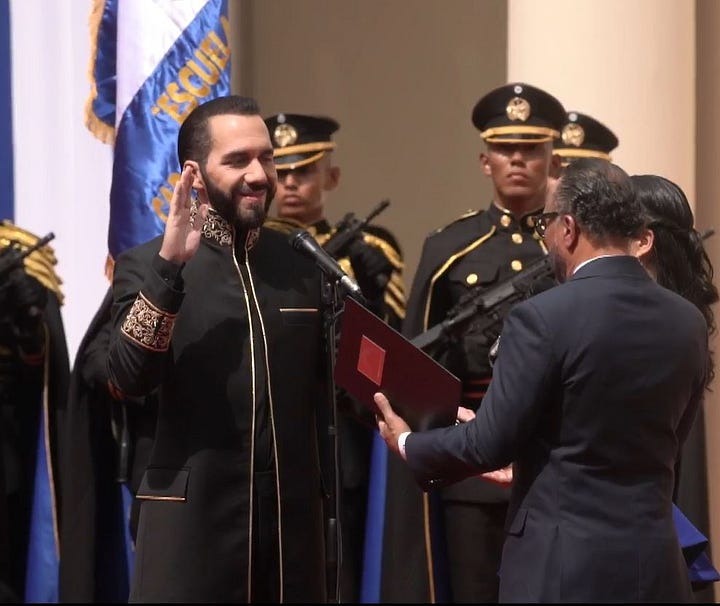How El Salvador became the prison capital of the world
One in 57 Salvadorans are already imprisoned. Bukele wants to double that number and hold convicted U.S. criminals
This is our “LATAM Wires” daily newsletter, freshly launched. Signing up will get you flash updates on breaking stories and snapshots of development on big headlines. And it’s free! We chose not to automatically enroll the thousands of subscribers from our PWS features newsletter, so if you’re already reading us there, and this interests you, sign up!

This week, Salvadoran President Nayib Bukele reiterated his February offer to hold currently incarcerated U.S. citizens in Salvadoran jails during a White House visit and press conference in the United States.
The idea has seemingly gained momentum in the Trump administration. On April 15 the U.S. president reiterated his support for the idea.
The next day, the Wall Street Journal reported that Bukele plans to double the size of the Terrorism Confinement Complex CECOT. The prison, designed to hold 40,000 prisoners, is already the largest in the world.
El Salvador also has the highest per-capita prison rate in the world — with 1 in 57 Salvadorans imprisoned as part of sweeping mass-arrests in which defendants face charges of gang affiliation or “terrorism”.
Bukele has achieved these numbers through a “temporary” State of Exception that suspends the civil liberties of citizens and greatly empowers police and security forces to make arrests, conduct searches, and engage in surveillance without warrants, as well as greatly restricts the rights of those accused.
Defendants often face group “trials” involving over one hundred defendants: many of whom have not been formally charged with a crime at all, but are rather being “held” until charges are put forth.
How El Salvador became a carceral state
El Salvador used to be one of the most dangerous places in the world. It now has a murder rate roughly equivalent to Canada. The story of the “El Salvadoran miracle” has been well-covered in both Spanish and English media, and opinion polls in the country reflecting his sky-high approval rating are accurate — in January he reached a high-water mark of 91%.
When Bukele took office, his administration carried on informal power-sharing deals with various gangs, the most famous of which was La Mara Salvatrucha (MS 13).
MS-13 formed in the U.S. in Los Angeles in the 1980s and was exported back to El Salvador as a side effect of U.S. deportation programs. By 2019, the year Bukele took office after a short term as the mayor of San Salvador, they were one of a number of organized criminal groups that held power over much of the country— their principal engine of funding being extortion of communities and businesses.
The power-sharing deal held until March 2022, when gangs committed a wave of violence that culminated in 62 murders in one day — an astonishing number in a small country of only 6.3 million people.
The next day, Bukele’s government announced a “temporary” State of Exception, limited by the Constitution to a maximum period of 60 days. The SoE has now entered its third year.
Even before the draconic security measures, Bukele purged the judicial branch of critics and even sent soldiers into Congress as part of widespread measures to remove checks and balances imposed by the Salvadoran Constitution.
The Biden administration largely ignored authoritarian backsliding in El Salvador in return for cooperation on migration policy, and free of meaningful international pressure as well as riding on considerable domestic popularity, Bukele again violated the Salvadoran Constitutional rules, this time prohibiting presidents from seeking re-election, to overwhelmingly win a second term in office in June 2024.


But as the violent crime rate plummeted in El Salvador, human rights violations skyrocketed. In addition to criticism from journalists in the country and NGOs like Human Rights Watch, international bodies like the U.N. Human Rights Office, have criticized the mass-arrests, which have at times even swept up children, and condemned dozens of deaths of suspects in police custody.
Bukele dismisses the criticisms as “supporting terrorists” and has repeatedly persecuted domestic journalists who conduct critical investigations into his policies.
With violence rates currently so low, even some supporters have begun to suggest that the State of Exception be lifted, it’s purpose having been seemingly fulfilled.
Bukele, however, has ignored the suggestions and apparently plans to double-down on mass incarceration efforts instead.



(Sorry for my bad English, sometimes, my daughter corrects me).
Joshua, I bet some people in El Salvador are really concerned about the brutal way to treat young boys at the Cecot. Bukele manipulated his re-election though some Salvadorans are still supporting him. One told me the people would win and expel him from the presidency.